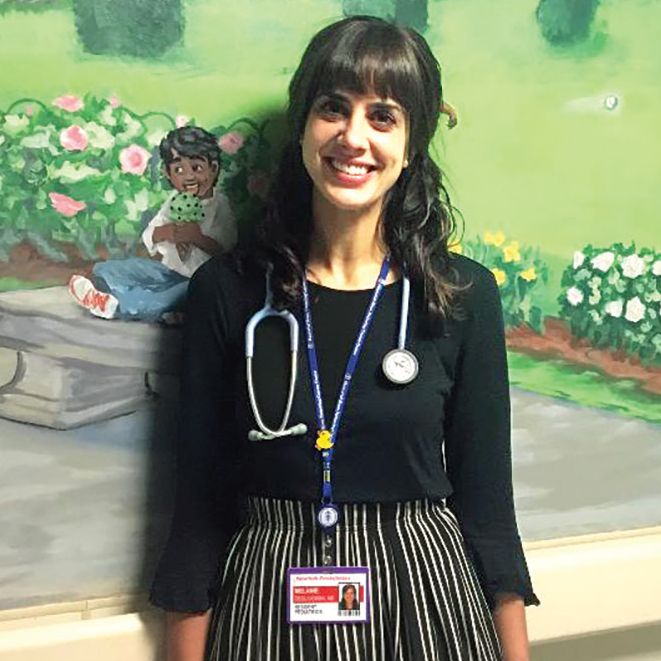- About
- Admissions
- Academics
- Athletics
- Student Experience
- Support
- Alumnae
Melanie Dabakis Degliuomini, MD, '05
Physician
As early as her sophomore year at Sacred Heart, Melanie Dabakis Degliuomini knew that she wanted a career in medicine. That year, her father succumbed to pancreatic cancer and, Melanie says, "I wanted to dedicate my life to a field that could do great good for others experiencing what my father and family went through."
After graduating from Fordham University with a BS in biology, Melanie obtained her MS and then her MD at Drexel University College of Medicine. Currently a third-year resident in pediatrics at New York-Presbyterian/Weill Cornell Medical College, she plans to specialize in pediatric oncology. "I always knew I wanted to focus on oncology," she says, "but my interest in pediatrics began during medical school when I was on rotation at St. Christopher's Hospital for Children." Starting next year, she will be doing a three-year fellowship in pediatric hematology/oncology.

As a pediatrics resident, Melanie sees 15 to 20 children each day when she is on an outpatient rotation, and 20 to 30 children daily on an inpatient rotation. Her young patients range from those coming in for well-child visits, to urgent care cases, to acutely ill children being admitted to the hospital.
"Children are amazing," she says. "They are beyond resilient. They can be acutely ill, admitted into the hospital, while having smiles on their faces and holding their favorite toys."
Still, she says, the obvious difficulty in her chosen field of pediatric hematology/oncology is the challenge of treating children with cancer. Despite the groundbreaking therapeutic advances, and new treatment options on the horizon, Melanie notes that there will always be children whose cancer is just too severe, not responsive, or unfortunately recurs. "And these," she says, "are by far the most difficult and heart-breaking moments."
At the same time, she notes, "The rewarding aspects of the field are endless. You treat the child in both their worst times and their best times. I cherish the long-term relationships formed with not only the patient, but the entire family. The rapport you build enables you to take this often lengthy and terrifying journey with them."
The work is difficult, with long hours and intense intellectual and emotional demands. But Melanie is devoted to the profession that she always wanted to be part of. "My work ethic is something that I absolutely learned at Sacred Heart," she says. "I also want to honor the influence that Sr. Mary Jane Paolella had on me. I will never forget her introducing us to the concept of DNA sequencing, and her pride in us as 'budding female scientists.' As I continue on my path, I will always be grateful for what she taught me."

